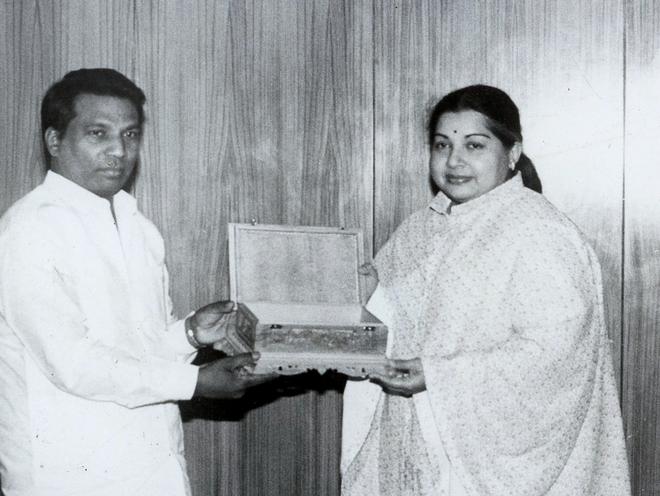
While the Maharashtra Speaker’s decision rejecting the plea of the Shiv Sena (Uddhav Balasaheb Thackeray) to disqualify legislators of the ruling Shiv Sena (Eknath Shinde) under the anti-defection law has triggered a row, Tamil Nadu saw a turning point case in political defection of legislators nearly three decades ago.
In January 1994, two AIADMK MLAs — VIT deemed university founder G. Viswanathan (Arcot) and Azhagu Thirunavukkarasu (Orathanadu) — were expelled from the party. Following this, Speaker Sedapatti R. Muthiah declared them “unattached members” in the Assembly. Thereafter, the two legislators joined the MDMK, founded by Vaiko. In 1995, AIADMK MLA Subburethinam represented to the Speaker that Mr. Viswanathan and Thirunavukkarasu should be disqualified as legislators under the anti-defection law. The two legislators argued that since they were “unattached members”, the provisions of the Tenth Schedule of the Constitution on disqualification did not apply to them.
Speaker’s ruling
The Speaker, however, ruled that they had incurred disqualification for being members of the Tamil Nadu Assembly under Article 191(2) of the Constitution, read with clause (a) of sub-para (1) of Paragraph 2 of the Tenth Schedule, and had ceased to be members of the Assembly with immediate effect.
After unsuccessfully challenging their disqualification before the Madras High Court, Mr. Viswanathan and Thirunavukkarasu (since dead) moved the Supreme Court.
On January 24, 1996, a Supreme Court Bench, headed by Chief Justice of India A.M. Ahmadi, passed a landmark verdict upholding the disqualification of the two legislators. The court settled the crucial questions of what would constitute an act of a legislator “voluntarily giving up membership” of a political party and a member joining another political party after his expulsion from the party for which he was elected.
‘No recognition’
The court noted that even if a member is thrown out or expelled from the party, for the purposes of the Tenth Schedule he will not cease to be a member of the political party that had put him up as a candidate for the election. He will continue to belong to that political party even if he is treated as “unattached”.
“We are of the view that labelling of a member as ‘unattached’ finds no place nor has any recognition in the Tenth Schedule. It appears to us that the classification of the members in the Tenth Schedule proceeds only on the manner of their entry into the House,” the Bench said. “In our view, it is impermissible to invent a new category or clause other than the one envisaged or provided in the Tenth Schedule of the Constitution. If a person belonging to a political party that had set him up as a candidate gets elected to the House and thereafter joins another political party for whatever reasons, either because of his expulsion from the party or otherwise, he voluntarily gives up his membership of the political party and incurs the disqualification,” the court concluded.
‘A matter of convenience’
Being treated as “unattached” was only a matter of mere convenience outside the Tenth Schedule and does not alter the fact to be assumed under the explanation to paragraph 2(1) of the Tenth Schedule. “Such an arrangement and labelling has no legal bearing so far as the Tenth Schedule is concerned. If the contention urged on behalf of the appellant is accepted, it will defeat the very purpose for which the Tenth Schedule came to be introduced and would fail to suppress the mischief, namely, breach of faith of the electorate. We are, therefore, of the opinion that the deeming fiction must be given full effect, for, otherwise, the expelled member would escape the rigour of the law which was intended to curb the evil of defections which had polluted our democratic polity,” the Bench said.
Inference from conduct
The court also noted that in Ravi S. Naik vs Union of India and Others (1994), it was observed, “Even in the absence of a formal resignation from membership, an inference can be drawn from the conduct of a member that he has voluntarily given up his membership of the political party to which he belongs.”
The Supreme Court said, “If he, of his own volition, joins another political party, as the appellants [Mr. Viswanathan and Thirunavukkarasu) did in the present case, he must be taken to have acquired the membership of another political party by abandoning the political party to which he belonged or must be deemed to have belonged under the explanation to paragraph 2(1) of the Tenth Schedule.” Consequently, the Bench declined to interfere with the High Court’s order on the disqualification of the two legislators.
A reference point
While this case remains a reference point for jurists, the last word on this subject has not been said yet. In April 2017, on a plea from Samajwadi Party leader Amar Singh (since dead) for a second look at the status of expelled parliamentarians and legislators with regard to the Tenth Schedule, the Supreme Court referred the issue to a larger Bench. Singh had contended that the application of the Tenth Schedule to an expelled legislator is violative of the basic structure of the Constitution.
The questions before the larger Bench include is the view taken in the G. Viswanathan case as regards expelled MPs and MLAs in harmony with the Tenth Schedule correct; and is the decision in the G. Viswanathan case that expelled legislators must be “deemed to continue” to belong to the party which threw them out correct.







